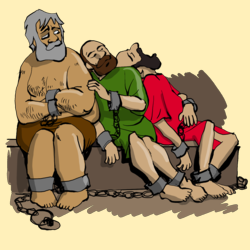 There is a huge disconnect between how Christianity is practised in the West today and what being a Christian meant in the earliest days of the church. In the first 16 chapters of the Book of Acts, there are three visits to prison, and several more arrests, trials, heated debates, floggings and stonings. In chapter 16, Paul and Silas found themselves whipped extensively and then thrown back inside to do some time as a result of a riot which had boiled over after they had cast a demonic spirit out of a slave girl who then lost her ability to tell fortunes and make money for her owners.
There is a huge disconnect between how Christianity is practised in the West today and what being a Christian meant in the earliest days of the church. In the first 16 chapters of the Book of Acts, there are three visits to prison, and several more arrests, trials, heated debates, floggings and stonings. In chapter 16, Paul and Silas found themselves whipped extensively and then thrown back inside to do some time as a result of a riot which had boiled over after they had cast a demonic spirit out of a slave girl who then lost her ability to tell fortunes and make money for her owners.
Imagine for a moment that you are Paul or Silas. What are you thinking, and how are you feeling at this moment? Chances are you would be turning over in your mind ways of turning the tables on your persecutors. Perhaps you would be imagining ways in which you could get them arrested and yourself freed. At the very least you might be composing in your mind a strongly worded letter to the editor of the local newspaper exposing the cruel injustices to which you had been subjected.
But Paul and Silas, although they had been thrown into the inner prison and their feet had been secured in stocks, were praying and singing hymns to God at midnight, and the other prisoners were listening to them. Jesus had said, “Blessed are you when people insult you, persecute you, and tell lies about you because of me. Rejoice and be glad, because you will have a great reward in heaven.” Paul and Silas were taking this instruction literally. Their testimony had an amazing effect on those who saw and heard them, and as a result the jailer and his whole family became believers.